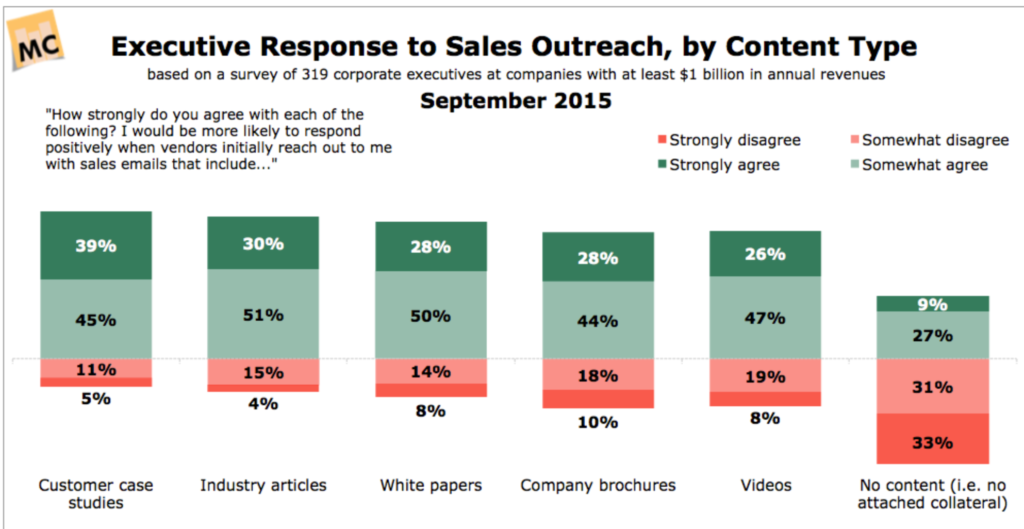If there is one marketing piece you absolutely need to create to help your B2B sales team generate sales, it’s the success story. Just like the Queen song Bohemian Rhapsody, success stories have supporters and opponents, but you can’t deny the evergreen quality of a good customer story.

B2B sales cycles can be long. And by that, I mean ridiculously long. In the past, I have worked for business-to-government companies where sales cycles literally take years. For sales people, it’s often a long process of continuous customer education, pitching and convincing.
Using content to shorten the sale cycle
Can content help to shorten these B2B sales cycles? Absolutely!
During the sales process, sales pros need educational marketing tools that help explain the problem that the customer is facing and the solution they are offering. They need tools that show that their company is a trusted brand to do business with. Customers need to be convinced that the product will work for them. Good content can do all that.
In B2B marketing, there is one constant that keeps popping up in the chart of most popular content types. It’s a content type that comes with many names: case study, success story, customer story, application story, testimonial…
It’s like the Bohemian Rhapsody of content types, because just like Queen’s evergreen hit, customer stories were popular years ago, they are popular now, and they will be long after today.
Customer stories were popular years ago, they are popular now, and they will be long after today.
Whatever you like to call them, success stories or case studies are real stories from satisfied customers that talk about the benefits of a product or service.
Thunderbolt and lightning: the power of success stories
You bet success stories are popular. Just look at the statistics.
According to a 2018 study of the Content Marketing Institute, case studies are among the most used content types in B2B.

B2B marketer have their reasons to use stories. According to a 2015 survey from LiveHive, 84% of a group of surveyed executives said they would be more likely to respond positively when vendors initially reach out with sales emails including customer case studies.

According to that same source, case studies are also very likely to drive leads and revenue.

Now, I can throw statistics in your face about the use of case studies all day, but I guess you get the picture.
There’s something intuitive about the way customer stories work and about the way people evaluate a product based on the opinion of their peers. If you have read Robert Cialdini’s book ‘Influence – the psychology of persuasion’, you know that social proof is one of the strongest drivers for making a buying decision. We tend to seek approval in other people’s opinions and that’s exactly what we find in success stories.
Why you need to start making success stories for your sales team
So, you’re in B2B marketing and you’re not making success stories yet? Seriously?

Let’s try to change your mind, because there are at least four reasons why success stories are a great asset to have for your sales team.
1. Customer stories educate the customer.
There’s no question that the more educated customers are, the more willing and ready they will be to make a buying decision. B2B buyers (and consumers too of course) educate themselves online first before making a buying decision.
That’s why a case study or customer story is great to have early in the sales process, even before an actual appointment with the sales representative takes place.
Customer stories can be used early and later in the sales process.
But stories also serve well later in the sales cycle. The days of the pushy vacuum cleaner sales guy putting his foot in the door are long gone. Today, B2B sales professionals focus on guiding the educated prospect towards the right decision. Good, educational content helps them to do that.
2. Customer stories make your company credible.
Making big promises in your marketing tends to raise suspicion with your customers. Today, people’s bullshit detectors are finely tuned. If your marketing message does not come across as authentic, they will drop you like a hot rock.
The first thing prospects ask after hearing your message is ‘Why should I believe you?’ Customer stories help you answer that question, because they add credibility to your claims. Success stories talk about how your product solved a real problem for a real company. Especially with high-risk investment goods, customer stories are essential for instilling confidence in your customer.
3. Customer stories simplify complex products.
What will make a bigger impact: the fact that your gizmo has 100 inputs instead of 50, or the fact that one of your customers has successfully solved his problem with your product?
Especially for complex technical products or services, it can be useful to show the benefits of different technical features for a specific project or customer. Stories can show the real value of complex technologies, which makes it easier for tech buyers to make the buying decision.
4. Success stories have an emotional appeal.
Yes, B2B buyers are people too. And just like consumers, they do not only make a buying decision based on rational criteria. Fear of rejection, risk aversion, loss of status… those are pretty powerful emotions with tech buyers. Success stories help buyers build a business case and therefore, they reduce some of that risk.
Customer stories help buyers build their business case, and therefore they reduce some of the risk.
Stories have that emotional element as well. They show the journey a customer has traveled to find your solution and how it solved his company’s problem.
Especially when you let your customer do the talking, by means of quotes, by showing real people, you make an emotional connection with the reader. A personal approach helps to validate that what you promise is true.
Customer stories for shorter sales cycles
Be it early or late in the sales cycle, success stories help customers make a buying decision and they enable sales teams to shorten the sales cycle. A general, beautifully branded customer story might work very well as a first impression. A more technical case study discussing a complex technical project might work better later in the sales cycle, when customers need more details.
Just like Queen’s best-known hit song, success stories have a long lifetime. Even when they are not dealing with recent products or services, customer stories can still make a considerable impact when they are talking about an important customer or a particular region.
Your turn
If you aren’t using success stories already, then today is as good as any day to start. Success stories are not that hard to create, although I would advise you to be a bit strategic about them.
Don’t just go and create any story that becomes available to you. Ask your sales team what they need and create stories that highlight the product, service, customer group or region that they like to focus on.
Want to get started with success stories?


